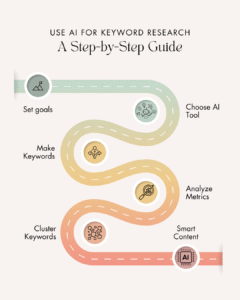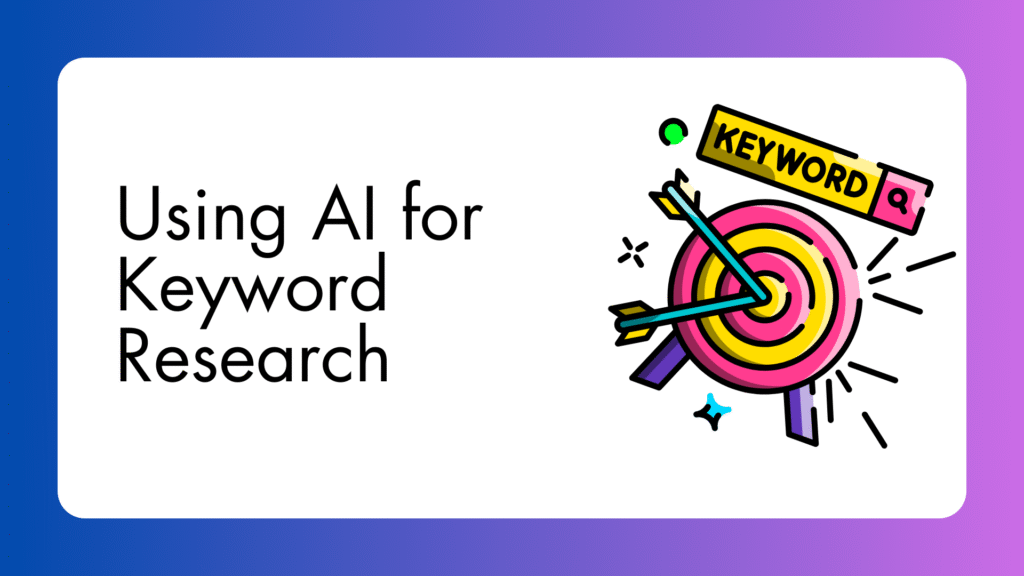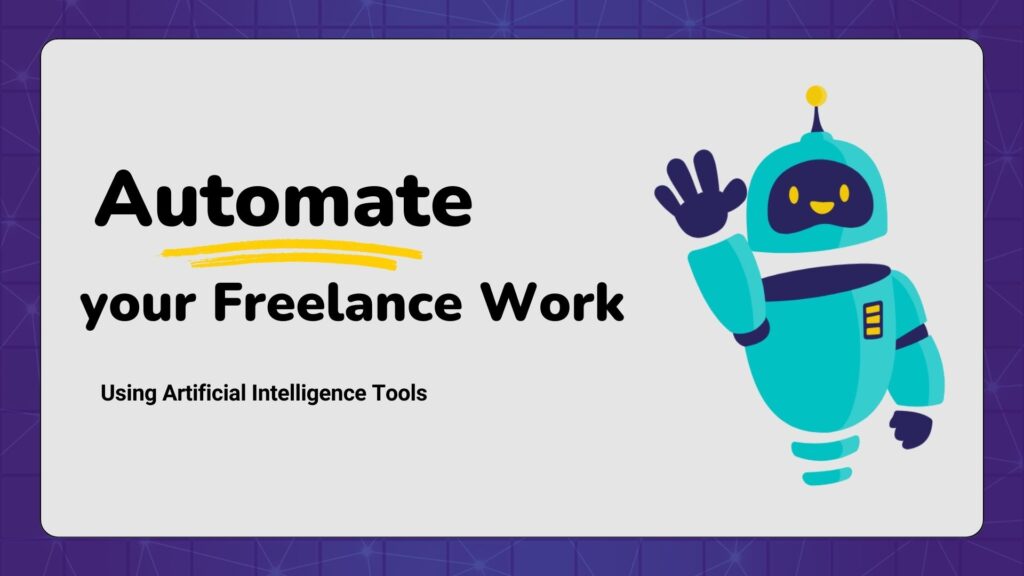Introduction:
In today’s digital world, writing great content isn’t enough. If you want your blog posts to rank on Google, you need to understand what your audience is searching for. That’s where using AI for keyword research comes in. Unlike traditional methods, AI-driven tools save time, analyze massive amounts of data, and uncover hidden opportunities you might miss.
Whether you’re a solopreneur, content creator, or freelance marketer, using AI for keyword research can completely transform how you create and optimize your content. In this step-by-step guide, you’ll learn why keyword research matters, how AI makes it smarter, and which tools to use to get ahead of the competition.
Why Keyword Research Matters:

Keyword research is the foundation of SEO. It helps you:
- Discover what people are searching for.
- Identify low-competition keywords.
- Align content with user intent.
- Drive targeted traffic to your blog or business.
Without keyword research, you risk writing content no one is searching for. But using AI for keyword research ensures your content has a higher chance of ranking, attracting the right audience, and generating revenue.
How AI Changes Keyword Research
Traditional keyword research tools rely on static data like search volume and difficulty. But AI tools take it further by:
- Analyzing Search Intent – AI can tell if a keyword is informational, navigational, or transactional.
- Predicting Trends – AI models spot keywords that are growing in popularity before competitors do.
- Generating Keyword Variations – Instead of a single keyword, AI provides clusters of related phrases.
- Content Gap Analysis – AI compares your site with competitors to reveal keywords you haven’t covered yet.
This means using AI for keyword research gives you deeper insights, helping you write smarter content that resonates with your audience.
Step-by-Step Guide to Using AI for Keyword Research:

Step 1: Define Your Content Goals
Before diving into tools, know what you want to achieve. Are you writing blog posts, product pages, or social media content? When you’re clear about your goals, using AI for keyword research becomes more strategic.
Step 2: Choose the Right AI Keyword Tool
Several AI-powered tools can make the process easier. Popular ones include:
- SEMrush – Great for competitor analysis and keyword clusters.
- Ahrefs – Excellent for backlink + keyword research insights.
- Surfer SEO – Uses AI to recommend keyword density and content structure.
- Uber suggest – Beginner-friendly with AI-driven keyword ideas.
When you start using AI for keyword research, pick one or two tools instead of overwhelming yourself with too many options.
Step 3: Generate Seed Keywords
Enter a broad topic into your AI tool. For example, if you run a freelancing blog, you might type “AI tools for freelancers.” The tool will then generate hundreds of keyword ideas.
Here, using AI for keyword research means you’re not just getting search volume—you’re also getting intent-based suggestions that show exactly what your target audience wants.
Step 4: Analyze Keyword Metrics
AI tools will provide key data:
- Search volume (how many people search each month).
- Keyword difficulty (competition level).
- Cost-per-click (CPC) (useful if you plan to run ads).
- Trend graphs (is the keyword growing or declining?).
When using AI for keyword research, look for keywords with high intent + moderate competition.
Step 5: Group Keywords into Clusters
Instead of targeting just one keyword, AI tools recommend clusters of related terms. For example:
- “Best AI tools for keyword research”
- “AI keyword research guide”
- “Using AI for keyword research in SEO”
By writing one article that covers all these variations, you improve your chances of ranking for multiple keywords.
Step 6: Map Keywords to Content
Every keyword should serve a purpose. Some belong in blog posts, others in product descriptions. When using AI for keyword research, align keywords with the right type of content to maximize results.
For instance:
- Informational keyword → Blog post or tutorial
- Transactional keyword → Product page or sales copy
Step 7: Create Optimized Content with AI Support
Now that you have your keywords, it’s time to write. Tools like Jasper AI, Copy.ai, or ChatGPT can help generate drafts, outlines, and ideas. Pair them with your keyword list, and you’ll get content that’s both optimized and engaging.
This step truly shows the power of using AI for keyword research—you’re not only finding the right words but also creating content that ranks.
Recommended AI Tools for Keyword Research:
Here are some tools you can recommend (affiliate opportunity):
- SEMrush – Advanced SEO + keyword research features.
- Ahrefs – Best for competitor keyword analysis.
- Surfer SEO – Perfect for on-page keyword optimization.
- Moz Pro – Beginner-friendly with AI suggestions.
- Frase.io – AI-powered content briefs + keyword clusters.
If you’re serious about scaling your content, start using AI for keyword research with at least one premium tool.
Common Mistakes to Avoid:

When starting out, many creators make these errors:
- Focusing only on high-volume keywords (too competitive).
- Ignoring long-tail keywords (less competition, higher conversion).
- Not updating keyword research regularly (trends change).
- Stuffing keywords unnaturally into content.
Instead, focus on natural use. If you strategically place using AI for keyword research in your content 10–15 times, you’ll signal relevance to search engines without overdoing it.
Final Thoughts:
If you want your content to stand out in 2025 and beyond, using AI for keyword research is no longer optional—it’s essential. By leveraging AI, you save time, uncover hidden opportunities, and create smarter content strategies.
Start with one tool, practice the step-by-step method, and keep refining your approach. The more consistent you are, the faster you’ll see results.
Remember: the creators who adopt AI early gain a massive edge. So start using AI for keyword research today—and watch your blog grow faster than ever.


